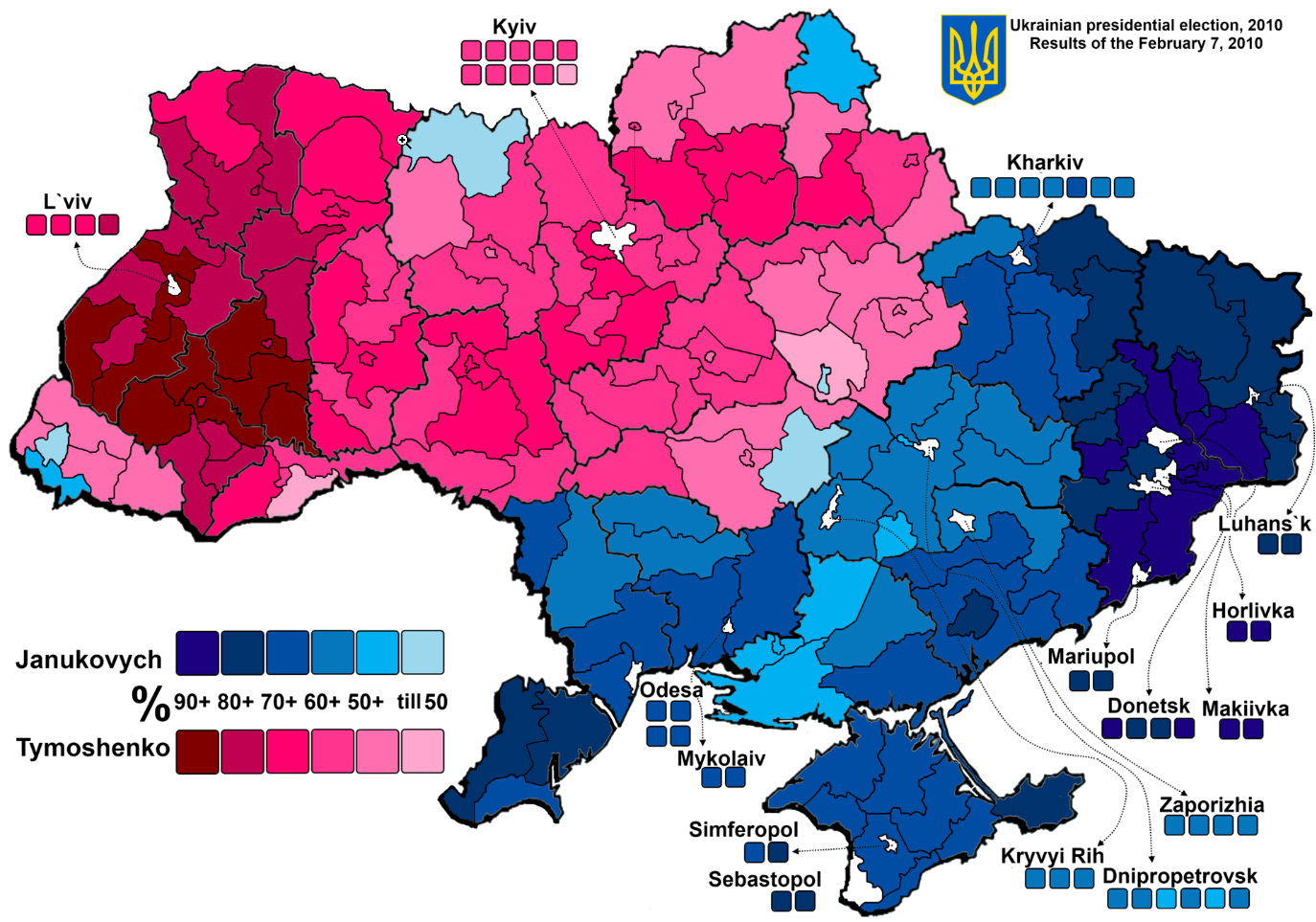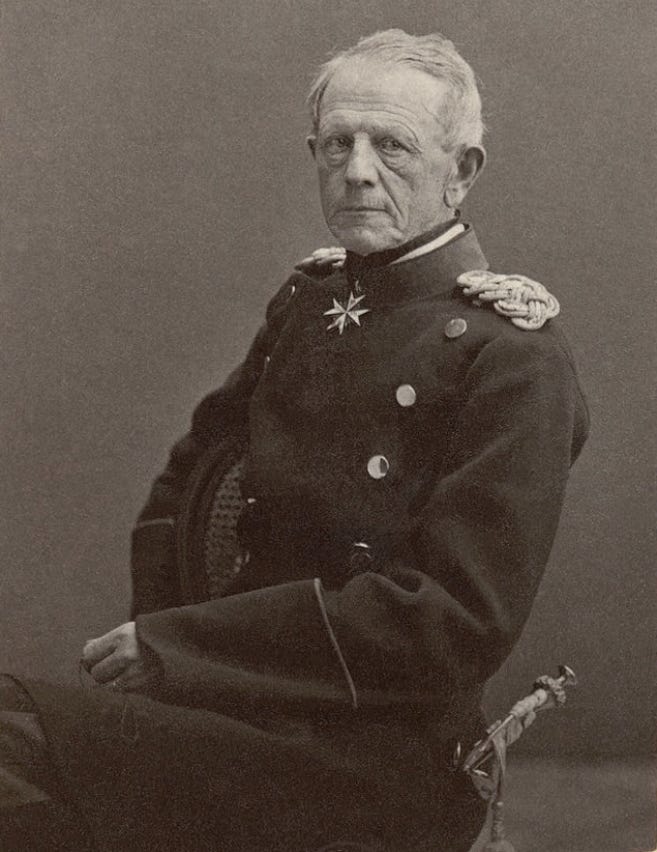The Allure of Battle - Part II
The Russo-Ukrainian War as Validation of the Nolan Thesis
The contemporaneous Russo-Ukrainian War, in my estimation, is a classic example that proves the rule as outlined in my prior post. To briefly reiterate, the conventional wisdom on warfare is that the decision of large battles determines the outcome. This is untrue. Large battles hasten the rate of attrition but do not by themselves produce a winner. It is the belligerent that can tolerate higher losses, inflict heavier losses, and politically adapt that will emerge victorious, regardless of the tactical genius of their captains and generals.
Nationalism is a powerful force that can take an utterly divided population, like Ukraine was per the below the electoral map, and bring disparate factions together under the mantle of national survival. There are certainly thousands of formerly Eastern-aligned, anti-NATO Ukrainians fighting and dying in the armed forces right now fighting the very country they had an affinity for just half a decade ago. And there were plenty of good historical, cultural, and linguistic reasons for that affection. A bloody invasion replete with atrocities will do much to sour the prior fondness Eastern Ukrainians once felt towards Russia and Russians.
Electoral Map of Ukrainian Presidential Results from 2010 - notice the East v. West divide
Remember, public opinion in the US was strongly against intervention in WWII prior to Pearl Harbor. Per the below Gallup poll results, after Germany invaded Poland which pulled France and Britain into a fresh war, only 16% of Americans supported direct military intervention in the new conflict. The following year during the 1940 election season as late as November, five months *after* the Fall of France and the perilous Battle of Britain, FDR was on the campaign trail and said to an audience in Cleveland, “the first purpose of our foreign policy is to keep our country out of war.”[1] It took the Japanese attack on Pearl Harbor the following year to galvanize support for US entry into the conflict. Only after the American people felt the nation itself was under mortal threat, not before, could factional enmity be put aside, and sacrifices be made that are required to wage brutal, ruthless total war.
Gallup poll results from Sept. 1939 - Majority support for supplying foodstuffs and even military equipment, but broad refusal to get directly involved
Prior to the full-scale invasion in February 2022, the Russians had a significant foothold in the Donbas and still enjoyed modest support from some in the Eastern Oblasts. It’s hard to know exactly why the Kremlin decided that prosecuting the Donbas War of 2014 – 2022 was no longer tenable, but among those reasons is belief in the ‘short war delusion’. Putin believed that given the West did not forcefully respond to 2014, they would not do so in 2022. Moreover, Russian intelligence assessed (or at least they told him) that his military could deliver a victory over Ukraine in a few short weeks. Leaders full of hubris and wearing rose-colored glasses have led countless nations into ruin by initiating aggressive wars of choice they believed would quickly end. We can call this malady the short war delusion.
Helmut von Moltke the Elder, in an episode that should be much more famous than it is, warned the Reichstag against attempts at the kind of short, sharp wars he had won on three occasions. Defeating the Danes in 1864, the Austrians in 1866, and the French in 1871, it was these victories that transformed Prussia into the German Empire. Moltke recognized, however, that by 1880[2] Germany’s position had changed. No longer would they fight their foes one at a time. In his time, Prussia was one power of several in Central Europe, but with the formation of the Empire, the balance of power shifted to favor them. Other powers like France, Britain, and Russia would not sit on the sidelines of another war if it meant further enlargement of Germany should they sit out. These potential enemies now arrayed against them were part of large would-be coalitions capable of fielding huge armies and sustaining significant casualties without yielding in a single summer’s campaign. Principally, citing the growth of the French and Russian armies, both nations that would be joined in a mutual defense pact by 1894, Moltke argued for the new German Empire to use its strength to maintain national security, create alliances when possible, and preserve the peace of Europe, i.e. fight as part of coalitions against aggressors – not start wars of aggression. The next generation of German leaders failed to heed his advice; we know how that story played out.
Helmuth von Moltke the Elder, Prussian Chief of Staff c. 1870s
Returning to current events, even if the anticipated Ukrainian counteroffensive returns mediocre results, they show no signs of losing the will to fight. They will continue to fight so long as they have Western support, both financial and military. Even if, in the end, the US-led coalition holds aid hostage to force peace, that peace would require the rump Ukrainian state to be admitted into the EU at least with de facto NATO membership included. In the territory that will be ceded, such as the outer edges of the Donbas as well as the Kherson and Zaporizhzhia Oblasts, expect low-intensity insurgencies to persist for years if not decades. For the Ukrainians, this conflict is generational and will be waged by all means at their disposal.
On the Russian side, despite significant mistakes and dramatic reversals – their abortive Kyiv offensive, then the losses suffered in the Kharkiv and Kherson withdrawals – the leadership does not show signs of relenting. To be sure, morale is low, casualties are high, and finding additional volunteers will be increasingly difficult. Despite this, their economy has held up better than anyone expected, they have the manpower to mobilize through conscription, and Beijing will backstop the Putin regime given the benefits they now enjoy with a prostrate Russia.
The modal conclusion is coming into focus: following the strategic failure of the Russian onslaught and then a Ukrainian counterpunch, a bloody stalemate will ensue. From there, both sides and their benefactors will forge a peace at the negotiating table with Russia receiving the territory they roughly control now, sans any losses in the coming months, in exchange for security guarantees (with teeth this time) for the rump Ukrainian state. It is deeply unfortunate that to reach that point tens of thousands more Russians and Ukrainians must die. Until the defensive prowess of one side proves too much for the offensive capabilities of the other, both will believe they have a chance of winning tangible military gains and will ruthlessly pursue those ends in the field.
I would never claim to be a fortune teller. The end game detailed above is what I believe to be a likely outcome, not the definite truth. Maybe the Russian army collapses in dramatic fashion, or Zelensky is killed, or Ukrainian forces encircle and capture 50,000 Russian troops in a stunning success that hastens peace talks, who knows? What is certain is both sides have the backing of powerful allies, large manpower reserves, and strong defensive works that have proven extremely tough to breach. The Russian short war delusion broke last year outside Kyiv. Will Ukrainian hopes for a mad dash to Crimea fall flat as well?
[1] http://www.ihr.org/jhr/v14/v14n6p19_Chamberlin.html, “How Franklin Roosevelt Lied America Into War”
[2] https://sites.pitt.edu/~syd/molt.html, “Document: Helmuth von Moltke, "Speech to the Reichstag" (1880)”





Insightful article that leads one to believe the War in Ukraine is not going to end anytime soon.